Perfect ten: The inside stories of England’s greatest away Test wins
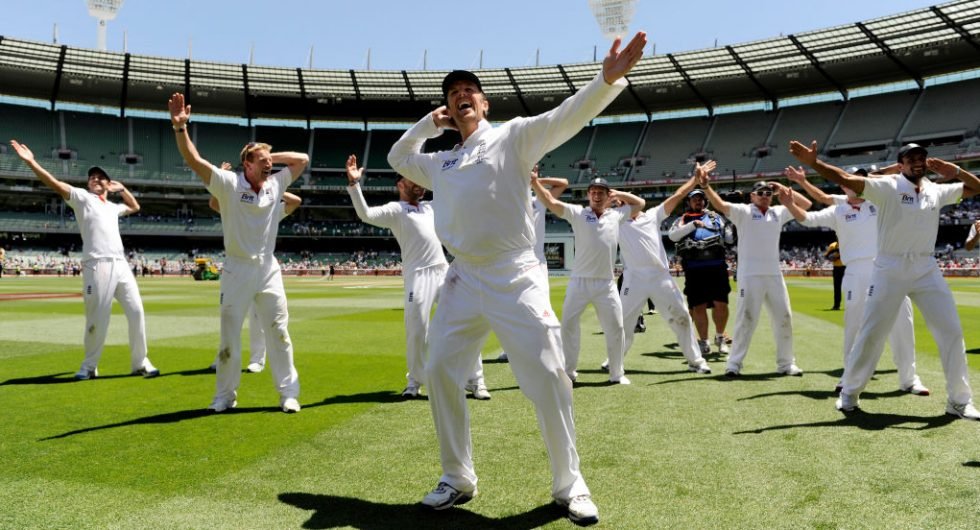
From Mumbai dustbowls to downing Australia down under – we spoke to Phil Tufnell, Alec Stewart, Shaun Udal, Graham Thorpe, Graham Gooch and Jonathan Trott to bring you the inside stories of England’s ten greatest away Test wins.
First published in 2016
10. Tuffers ties New Zealand in knots
England v New Zealand, First Test, Lancaster Park, Christchurch
January 18-22, 1992
On the face of it a one-sided victory over one of Test cricket’s less celebrated nations played out in front of a smattering of fans might seem small fry, but this match needs to be put in context for its true value to be appreciated.
England’s away form was woeful at the time, with just one win in their last 16 Tests and no series victory on foreign soil since the 1986/87 Ashes. The Kiwis were no mugs, either. In Wright, Jones and Crowe their batting boasted class and experience, while Danny Morrison and 22-year-old firebrand Chris Cairns formed a lively new-ball pair. This defeat would only be New Zealand’s third on their home patch in 35 Tests since 1979. Two months later they would reach the semi-final of a World Cup they probably should have won.
The match itself was a humdinger. Or, more accurately, the final session was. The contest appeared to be meandering towards a draw at tea on day five; the hosts 201-3 in their second innings, still 67 in arrears after being asked to follow on. England effectively needed to take seven wickets – more than had fallen on any of the previous four days – before New Zealand passed their first-innings total.
They weren’t going to get any help from a painfully slow pitch but Phil Tufnell was quietly producing something very special. After a chastening Ashes tour the previous winter – “Oi, Tufnell, can I borrow your brain? I’m building an idiot” – the mercurial left-arm spinner was bowling as consistently as he ever would for England. He’d taken five-fers in his last two Tests and was well on his way to a third when he lured John Wright down the track on 99 and Jack Russell did the rest.
Tuffers continued to whirl away, snaring four more, until last man Chris Pringle joined Martin Crowe. New Zealand’s skipper decided attack was the best form of defence and had brought the deficit down to four when, with three overs remaining, he attempted a lofted drive over the infield. A boundary would have meant salvation but Tufnell did him in the flight, the ball landing in the grateful paws of Derek Pringle at mid-off to give England a win that their Man of the Match admitted he hadn’t seen coming at the tea break.
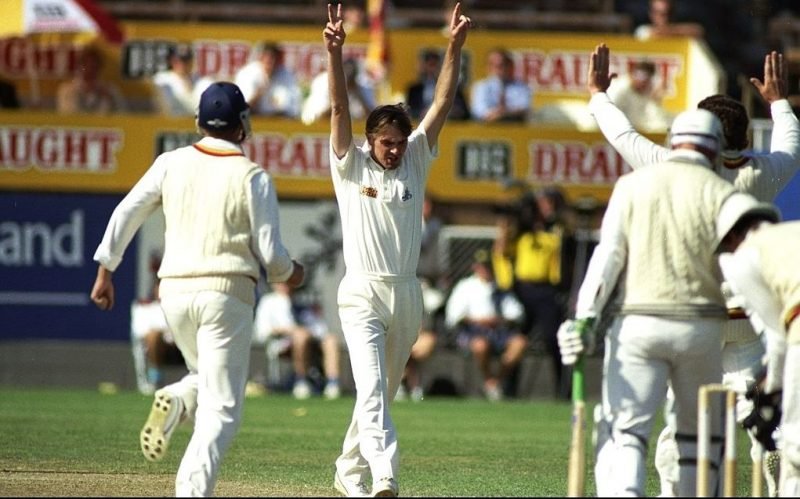
Phil Tuffnell played a starring role, returning with 11 wickets across two innings
Tufnell, who gave a typically laconic post-match press conference, fag hanging out of mouth, finished with 11 wickets in the match, his second-innings figures reading 46.1-25-47-7. England went on to win the next match at Eden Park to seal a first overseas series win in half a decade.
The Man
Tuffers recalls the climax at Christchurch.
“John Wright was on 99 just after tea, trying to save the game. They were three down and we needed seven wickets. Everyone’s just going: ‘Oh, it’s going to be a draw.’ He’s come down the wicket and, as I’ve let go of the ball he knew, and he went: ‘Oh no!’ He got stumped by Jack [Russell]. It was as if I was Malcolm Marshall, they went all jittery.
“Then, just towards the end, there was Martin Crowe and the No.11. If they’d hit four more runs, that meant that we’d have to bat again, which with only three minutes to go would have given them the draw. I bowled it, he hit it straight up in the air, got him caught at mid-off and we’d won the game. That was an amazing feeling! They were all good players; it was just that one session. It was madness…”
The Moment – Del boy pulls a fast one
Tuffers was undoubtedly the hero but without Derek Pringle’s intervention to dismiss Andrew Jones, strangling New Zealand’s No.4 down the leg-side with a half-tracker, the hosts would have cruised to a draw. Jones had put on a hundred-partnership with Wright but the former’s dismissal sent panic through the Kiwi changing room and sparked a collapse of eight wickets for 82 runs.
Crowe gambled all against a field brought in to save every run, and lost. It was the third consecutive Test in which Tufnell had taken five wickets in an innings, and his figures of 85.1 overs and 11 wickets for 147 runs were the fruit of flighted bowling of rare, old-fashioned craft.
– Wisden Almanack, 1992
9. Daffy inspires the birth of the Barmy Army
England v Australia, Fourth Test, Adelaide Oval, Adelaide
January 26-30, 1995
That England’s squad was so lacking in athleticism was the cause of much frustration with the selectors on the part of Michael Atherton, who had wanted a fit young team to take away in his second winter as captain. But he was not helped by bad luck: when his slightly shabby-looking lot arrived in Adelaide at the end of January, two-nil down with two to play, their injury list was almost laughable.
In all England had to call up a total of six replacements on that ‘94/95 trip, even at one point enlisting their physio Dave Roberts as an emergency fielding replacement during a tour match at Bendigo, only for him to break a finger in the warm-up, leaving him unable either to deputise in the field or treat the growing list of crocked and wounded.
But in they went at the Adelaide Oval, intent on playing more aggressively in the fourth Test having missed out on victory in Sydney despite dominating the match. They set a reasonable total in the first innings thanks largely to the efforts of an ageing and otherwise struggling Mike Gatting, who made 117 in a Test he might never have played were it not for the fitness crisis. It was his first Test century for seven-and-a-half years, and after England’s defeat in the following, final match of the series at Perth he was never picked again.
Australia got a lead of 66, with Greg Blewett tonning up on debut, and at 181-6 in their second innings, with a tail that included both Devon Malcolm and Phil Tufnell, England looked vulnerable on the fourth evening. But Phil DeFreitas survived to the close alongside John Crawley and then on the fifth day went on to complete the finest knock of his career – savaging Craig McDermott in particular and just missing out on what would have been his first and only Test century when out for a match-defining 95-ball 88. That, allied to Malcolm’s wonderfully unexpected mini-gem (29 from 18 balls including three fours and two sixes), put England in a position from which to attack.
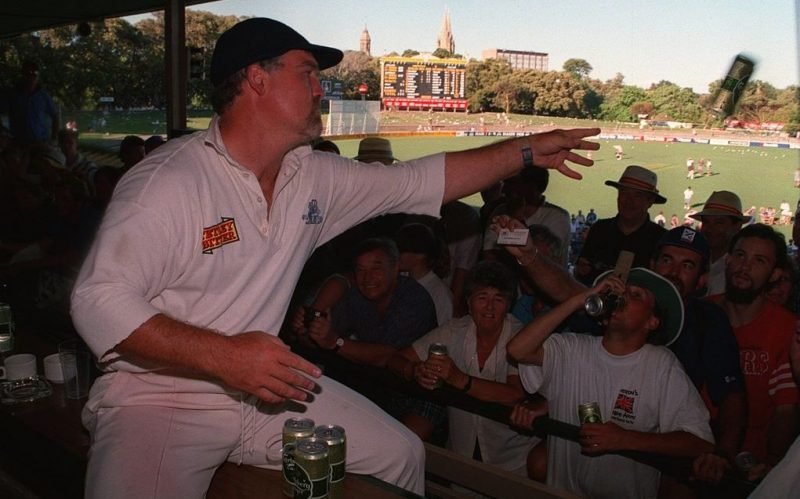
Mike Gatting offers beer to the Barmy Army troops after England’s win
Led by the aggression of Malcolm – with the ball this time – the bowlers combined to reduce Australia to 83-8, before finishing them off with 5.5 overs to spare and celebrating by sharing beers with members of the newly christened ‘Barmy Army’.
The Birth of the ‘Barmy Army’
It was during this Test that a group of England fans – led by Paul Burnham – had a set of t-shirts printed, each emblazoned with the line ‘Atherton’s Barmy Army’. They’d been given the moniker by an Australian journalist on account of their boisterously enthusiastic following of a fairly unsuccessful team on a chaotic tour, and this was the moment they embraced the name. The sight of the newly kitted-out Barmies being passed cans of beer from the dressing room by Mike Gatting, and singing along in celebration with Michael Atherton, gave a hint of the group’s future place as an essential ingredient in the world-cricket recipe.
8. England turn humiliation into triumph
England v West Indies, Fourth Test, Bridgetown, Barbados
April 8-13, 1994
England were coming off the back of humiliation at Trinidad. So much so, that when Alec Stewart and Michael Atherton took England to 47-0 on the first morning at Bridgetown, the sizeable English crowd cheered wildly. They wouldn’t stop for the next four days. Stewart takes up the story…
“Athers was early in his captaincy career, a few Tests in, and we treated Trinidad as a freak. We should have won it. I was getting on the bus on the fourth morning saying we’d be OK – they were in effect 67-5 overnight in their second innings. But Hicky dropped a couple of catches and Chanderpaul, in his second Test, batted well. It rained in the afternoon and that meant that once we’d bowled them out, Ambrose and Walsh could go full tilt at us for 20 overs before the close. That was that! Curtly said it was one of the best spells of his career.
“Arriving in Barbados it wasn’t the ideal situation, to put it mildly. A lot of people had seen the Trinidad Test on TV and paid big money to come out to see us, so there was a bit of trepidation on our part.
“We hadn’t won there for 59 years, and they’d won their last 12 Tests there. We knew it was their fortress. When Athers and me walked out to bat, it was like a home from home. There were probably 6,000 English fans out of a 12,000 capacity.
“We got off to a good start, on as good a pitch as you could wish to play on. If you whacked it in too short it’d go over your head, and there were plenty of pitches around the world that didn’t have those attributes.”
After the openers put on 171, Stewart pushed on to his first hundred.
“I’d played OK for most of that series, and felt good going into the innings. I wouldn’t say anyone enjoys facing quick bowling, but I enjoyed the challenge at least. You’re not getting forward to them but you can hit through the ball. You have freaky periods in your career when you’re suddenly batting on a different level, and this was one of them.”
After England posted 355, Angus Fraser got to work…
“Gus bowled out of his skin. To take eight-fer on that pitch in the first innings was an immense effort. I think he’s still annoyed that I got the Man of the Match award! Third innings, we were marginally ahead, and I made my second hundred. Very occasionally you get in that zone, and just play; everything’s moving right, it feels a whole lot easier, and you think to yourself that you’re playing pretty well. We were set up to go ahead and win it, and that’s what we did.”
On the final day Andy Caddick’s five wickets sealed the win, prompting pandemonium in the stands.
“They occasionally show it on Sky Classics on TV, and it brings it all back. The Bajans understand the game, they appreciate good cricket, and some of them were calling me a white West Indian! If you earn the respect of the opposition and their fans, you’re doing something right.
“Barbados was what I’d call a proper win. We got ahead right from the start and played solid, aggressive cricket. We could put Trinidad to bed.”
7. England summon their Ring of Fire
England v India, Third Test, Wankhede Stadium, Mumbai
March 18-22, 2006
The tale of Shaun’s match
That winter, 11 years after his first taste of international cricket, 36-year-old Hampshire off-spinner Shaun Udal was drafted into England’s touring squads. After missing the first two India Tests through illness, he was called in for the Mumbai match. England had to win the match to share the series. He takes up the story.
“I was told the day before the match that I was in. We’d looked at the pitch and seen it was dry and brown, so we knew it was going to spin. Freddie spoke to me and said just to relax and that I was there on merit. At that stage of my life, it was an unexpected bonus anyway. It liberated me, and then on the morning of the match Alastair Cook was struck down ill, and there was a sense around the camp of, well, nothing else can go wrong, we may as well get out there and give it a good crack and see where we end up.
“Owais Shah came in for Cook, and India actually won the toss and bowled. As the coin came down I remember Freddie wincing and looking away, and then Dravid surprising everyone by saying they’d be bowling first. No one saw that coming.
“It gave us all a lift. Strauss made a good hundred, Bell got a few and Owais got 80-odd on debut, running down the pitch to Harbhajan from the first ball he faced, and we got up to 400.
“When we came to bowl I was a bag of nerves. My hands were sweaty, I couldn’t grip the ball, my first few overs were dreadful. It was horrible. At the end of day two, I’d bowled awfully, and I remember going back to my room and thinking I’ve blown it. What do I do? Then I got a message from Shane Warne. He’d texted me asking how things were going and I told him I was in bits, that I wasn’t used to this feeling. And he just reassured me that I was there on merit, that I was picked because I was the best in the country at what I did, and to forget everything else. He said that if this was to be my last time, to go out giving people good memories. Coming from somebody of his stature, it made me feel a bit more important and wanted. I resolved to give it a crack.
“I got a wicket on the third day, and then I got asked to be nightwatchman overnight, which I’m not good at doing. Suddenly I was batting at No.4 for England, which was ridiculous. I got dropped, twice, in the slips, and I remember coming off and Duncan Fletcher saying it was the worst nightwatchman display he’d ever seen in his life. I batted for an hour and a half in 42-degree heat! The heat was so intense, and the smell too, we were in the middle of Mumbai and it was just awful. It was packed out, 40-odd thousand in the ground, and the atmosphere was incredible, but it was hard work.
“The time spent batting gave me a lot of confidence. Freddie got some runs, and we ended up setting them just over 300. Jimmy got a wicket on the fourth evening and we went into the last day knowing what we needed. The spinners were under pressure. Monty had bowled before me and hadn’t bowled very well. Fred gave me the nod two overs before lunch and it came out really well. At lunch India were three down with Dravid and Tendulkar at the crease. Then came the Ring of Fire incident…
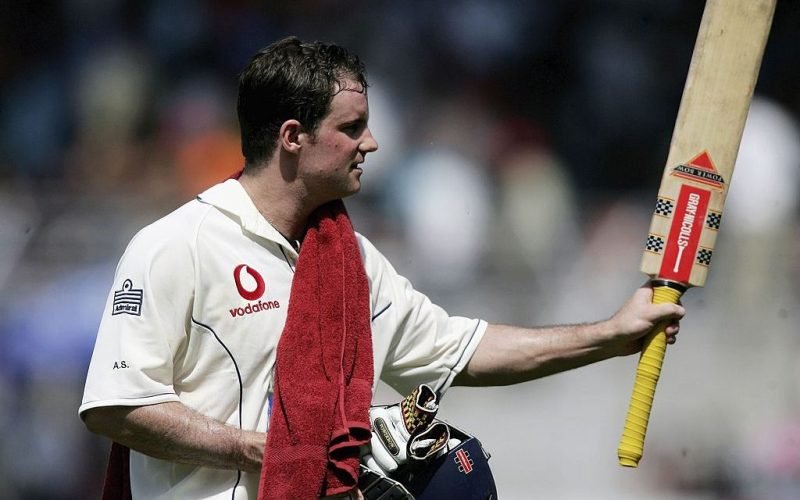
Strauss’ 128 propelled England to a first-innings score of 400
“Fred was very much a leader by example. It was all about what he did. He wasn’t big on motivational speaking – but you don’t need that anyway. He was very relaxed, he let you be yourself, but he made you feel important. That was his golden period when he could do no wrong, and that lunchtime was a case in point.
“Everybody was worried about the fact that we might actually clinch a victory here. We were all a bit quiet in the dressing room, and Freddie, in his towel, just got up and put Johnny Cash on, and literally started running around the dressing room dancing and singing, and we all just joined in! The umpires walked past thinking, what the hell’s going on here? And then Dravid and Tendulkar walked past as we’re singing our heads off. I can still picture us walking out in front of 40,000 people and singing Ring of Fire straight after lunch. Fred got rid of Dravid first over, I got Tendulkar next over, and that was pretty much that…”
Fred …
“Mumbai was the best feeling of my career. To win it, with the team we had, in them conditions… I was meant to go home for the birth of my son, but I didn’t go because I was captain, so it made it feel like it had been worth staying and there was a lot to celebrate. We had a party on a boat and then I went and got a flight home because I wanted to see my son. I bumped into Jack Simmons and Jack Bond, two Lancashire lads, in duty free. We drank a bottle of something they’d ordered, and got on the flight and I ordered a drink and the stewardess said by the time she’d come back I’d gone to sleep! Perfect flight…”
The Moment
Sachin Tendulkar c Bell b Udal 34
“You get a picture in your head of how you want to get somebody out. He wasn’t in the best of form at the time, so he wasn’t looking to attack. I thought to myself, I think I can get him caught bat-pad. It was all set up perfectly because a couple of left-armers were playing in the match, creating that rough outside the right-hander’s off-stump. It hit the rough, he got unlucky to receive the one ball I turned in my whole career, and Ian Bell took a good catch at short-leg. Then I ran around like a lunatic for a few minutes. I was trying to find Freddie but I ended up with Owais Shah! You’ve waited all that time for something like this, to make an impact in a Test match, and to make it like that, getting out the best player who’s ever lived, was… very nice.”
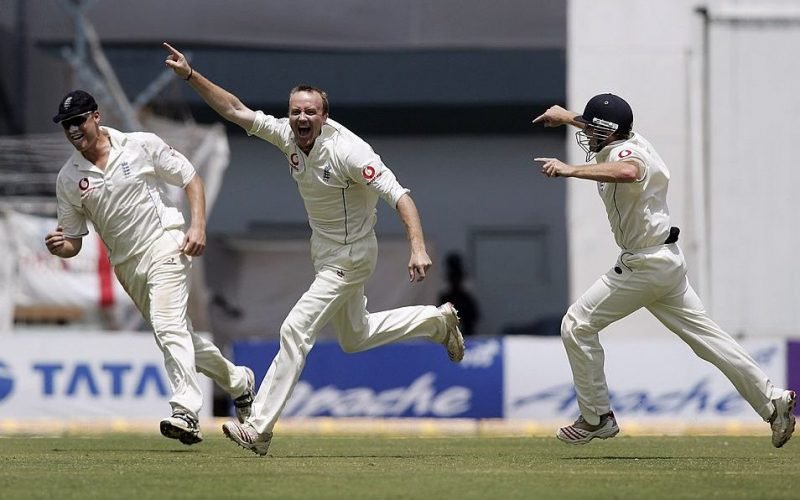
Shaun Udal goes on a celebratory run after dismissing Tendulkar
6. Graham Thorpe’s finest hour
England v Sri Lanka, Third Test, Sinhalese Sports Club
Colombo, March 15-17, 2001
Bad blood, batting collapses, rank umpiring and an English batsman on a tour too far: those pre-DRS tours to the subcontinent were great fun.
The “pre-DRS” caveat is important. It is cricket’s wont to operate on a plane where the good is great, the average is plucky and the bad has no place whatsoever. But, as morally uncouth it was to question an umpire and do so publicly in a local rag, which ‘outed’ BC Corray as “batting for England” when the visitors benefitted from some shockers in Kandy to draw level in the series, the niggle spiced the third and final course to near Lankan perfection, and it was delicious.
The fines sheet for the tour encompassed dissent to umpires, helmets tossed over the boundary rope and excessive appealing. Then there were the ‘off the record’ misdemeanours: Craig White allegedly being racially abused during a tour game, Darren Gough blowing gaskets at club opposition and teammates, Robert Croft putting his bat through a window after ending up on the wrong end of the umpire’s finger.
Even Atherton and Sangakkara, whom both now dine at the cricketer-sophisticate table, were reduced to brawling out in the middle at Kandy, accusing one another of cheating. Sanga chirped, Atherton wagged his finger and match referee Hanumant Singh dished out a severe reprimand before a very clear “final warning” to both sides going into the Colombo Test.
This series marked the end of an era when touring Asia came with the suspicion that somewhere along the way they were going to be hoodwinked. Even though England arrived in Sri Lanka fearful of the wrist and elbow contortions of Muttiah Muralitharan, they also had some coping mechanisms, and they worked: Murali would finish the series averaging over 30 with less than five wickets a Test.
That’s not to say there were not English casualties. Graeme Hick endured a horrific time with the bat and was saved from more fear and loathing at the Sinhalese Sports Club. Hick never played a Test again and spent the next eight summers hitting 8,728 shades out of county attacks. His replacement was Michael Vaughan.
While Hick and the rest struggled, Graham Thorpe was imperious and proved to be the difference between the two sides.
Sri Lanka won the toss and batted first in the certainty that the pitch would deteriorate session on session. It all added to the hostile air. “There was a lot of shit going on,” remembers Thorpe. “It became a bit of a grudge match.” The wicket of Atapattu, bowled by Caddick, was the only success England had in the opening session, as Jayasuriya and Sangakkara played on with relative ease. A big first-innings total looked in the offing, only for an inspired Darren Gough to clang and then dismiss Sangakkara, before Ashley Giles and Croft combined for six middle-order wickets – their best shared innings haul of the tour. Croft took four himself, including the wicket of Mahela Jayawardene, who had come in at five and, with Aravinda de Silva, put on 97 before the last seven wickets fell for 36.
A sharp start for England, including Atherton hitting Vaas for three fours in his second over – was curtailed by Vaas’ fifth dismissal of Atherton in six innings and then Dinuka Hettiarachchi taking the wickets of Marcus Trescothick (via the baggy shirt of Russel Arnold at short-leg) and skipper Nasser Hussain. With Thorpe batting like no other, ably assisted by Vaughan, they made it to stumps on day two on 71 and 26 respectively, just 66 behind Sri Lanka’s first innings score. What followed was one of the more absurd days in cricket’s recent history.
The numbers tell the story: 22 wickets fell as spectators were treated to three innings in a day. The carnage meant 12 of the 36 dismissals in the match were for ducks. And yet, Thorpe wasn’t dismissed once.
England’s first innings finished around him on 249 – a lead of eight – as he ran out of partners on 113, Vaas taking 6-73.
“From a physical point of view, it was my hardest hundred and probably my best,” says Thorpe. “That was shattering.” Then it happened.
Inside 30 overs, Sri Lanka’s second effort was done. Gough and Caddick accounted for the top four – Atapattu completing his pair – as they kept things full and straight and allowed the pitch to do the rest. Giles then took four of his own for 11, while Croft’s single wicket handed Arnold his pair. Sri Lanka were skittled for 81 and England needed 74 to win.
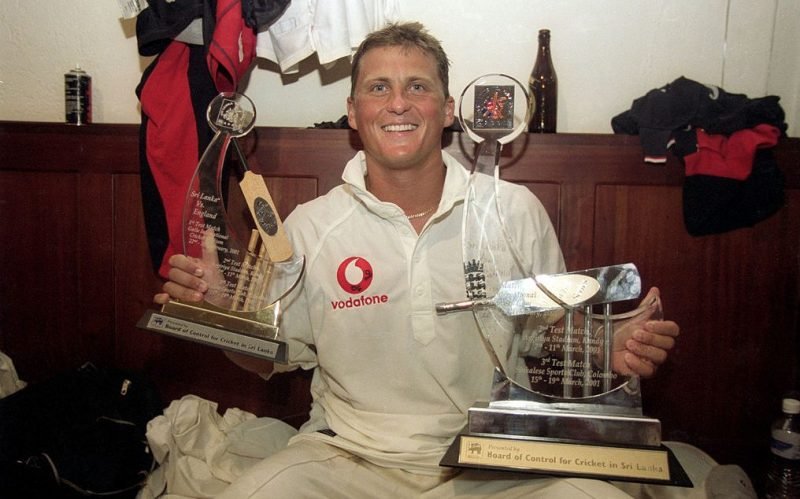
Gough, who took 14 wickets from three Tests was adjudged Player of the Series
There was still enough time for alarm and the England fans – estimated to be around 2,000 – were going to have to fret for their victory sups. A thigh injury meant Hussain went down the order, expecting not to be needed. Out he limped at No.7, at 63-5, and back he walked at 71-6. Luckily, Thorpe was on his way to an unbeaten 32 to seal the match and the series.
The win was historic: it was the first time England had won four series in a row since Mike Brearley’s side in 1978/79. It was also the first time since 1888 that England had come from behind to win a three-match series.
Gough, with 14 wickets at 19.57, was announced the Man of the Series. “We deserve everything we get,” said Gough post-match. “Now it’s time to go and get absolutely hammered.”
5. KP’s masterpiece, Monty’s web
England v India, Second Test, Wankhede Stadium
Mumbai, November 23-26, 2012
England’s Matt Prior recalls a crazy four days in Mumbai …
“Judging by the pitch prepared… they still didn’t think we could play spin. It was an absolute Bunsen. We saw immediately that it was going to rag and bounce, and knew we’d better get used to it quickly. We might have preferred to win the toss, but we were reasonably pleased to have dimissed India for 327, with Pujara again batting very well in making a century.
“But then we were treated to a batting masterclass by KP. Cooky made a superb 122, but it was KP’s 186 that took the game away from India and made sure we had a vital lead of 86 on the first innings. It was like the knocks KP had played earlier in the year in Colombo and Headingley. They were knocks that no one else in the world could have played. They were that good.
▶️ A 10-wicket victory for England in Sachin’s backyard
▶️ A forgotten hero, resurrected@Phil_Wisden on Kevin Pietersen’s masterclass in Mumbai ✍️Wisden’s Performances of the Decade, brought to you in association with @PerryUniform.https://t.co/sUrkpLu3tf
— Wisden (@WisdenCricket) December 14, 2019
“Cricket in India is a very different game from the one that we play in England. You need to embrace the conditions and in [Swanny and Monty] we had players who can do that. They both bowled superbly, but I do reckon that, if you asked them to nominate one pitch in the world that they could roll up and carry around with them, they would say this one. That’s why I think it was the way Cooky and KP batted that won us the game, and why KP was quite rightly named Man of the Match.
“How big a win was it? A few of the lads compared it with the Ashes win in Adelaide in 2010/11, where we lost a big toss and managed to turn the game around. But here we lost the toss and the conditions were so completely in India’s favour. No one gave us a prayer, but our batsmen and spinners outperformed theirs in their backyard. For me it was a huge win, the biggest I’ve been involved in, and one of the proudest.”
– From Matt Prior’s autobiography, The Gloves Are Off
Regardless, all 28 wickets to fall to bowlers following Gambhir’s removal in the game’s first over had now gone to spin. Perhaps determined not to add to the tally, England’s openers knocked off the runs in under 10 overs. India looked ashen-faced. From nowhere, the series had come alive
– Wisden Almanack, 2013
4. The pre-Ashes classic
England v South Africa, Fourth Test, Wanderers
Johannesburg, January 13-17, 2005
Under darkening Johannesburg skies, Matthew Hoggard, hair ruffled like he’d dipped his head in white candy, finds the edge of Dale Steyn’s dangling bat and sees Geraint Jones take the catch. He doesn’t look around to watch Steve Bucknor raise his finger, instead he lets out a squeal, keeps on running and piles into a noisy, bouncing huddle of English celebrations.
A truly remarkable last-day win was complete, powered by Marcus Trescothick’s second-innings 180 and finished off by Hoggard’s 7-61, one of the great displays of archetypal English swing bowling. In the Wisden Almanack, Matthew Engel called the Test “one of the most riveting of modern times”.
And here’s the set-up to it, the all-important context: England had won all seven Tests of the 2004 summer, slaying New Zealand and West Indies under the aggressive leadership of Michael Vaughan and driven by their best pace attack – Hoggard, Harmison, Jones, Flintoff – since the 1950s. They headed to South Africa having lost only three of their 19 Tests since losing to Australia in 2002/03.
There have been a few more candidates since this list was published.https://t.co/Dyqp52aIOg
— Wisden (@WisdenCricket) August 22, 2020
South Africa would be their toughest test yet. They boasted a stellar attack of Shaun Pollock, Makhaya Ntini, Dale Steyn, Andre Nel and Jacques Kallis, and a batting line-up including Graeme Smith, Herschelle Gibbs, Kallis and debutant AB de Villiers. They had lost only two home series (both to Australia) since readmission in 1991. Beat that.
So England did. They made it eight wins in a row at Port Elizabeth, and only bad light prevented a ninth victory at Durban. But a Kallis hundred at Cape Town led to a 196-run defeat, and the series was level as the teams travelled to the penultimate Test at Johannesburg.
Bad memories surfaced at the Bullring. England’s last visit there was Duncan Fletcher’s first as coach, when England had infamously fallen to 2-4 and an inevitable innings defeat. They’d won only twice in Johannesburg since the First World War, in 1927 at the Old Wanderers and in 1956 at the New Wanderers.
It started well. Toss won, and their man of the moment carried on his startling start to his Test career: Andrew Strauss, with two centuries in his debut summer, added 112 and 94* at Port Elizabeth, and then 136 at Durban (he would top-score in six of the 10 innings across the five Tests). The South African attack had unwisely fed his back-foot strengths, and this time he made a fluent, judicious 147, and when the bowlers did finally pitch it up he retorted by driving them through extra-cover: rarely has an English batsman been in such rich form as Strauss on that tour.
With England on 411-8 at the end of the second day – cloud cover had made batting increasingly difficult – Vaughan declared overnight. He and Fletcher had expected the clouds and damp to remain. And this is where the problems began.
The weather improved and Hoggard and Harmison were wasteful. Things got worse: James Anderson had replaced Simon Jones, but he had been out for five months with a back problem and returned with a remodelled action: he was hammered by Gibbs, who made 161 (Anderson shed tears of embarrassment when he finally had Gibbs dismissed). Harmison was struggling with a calf injury and his radar was having one of its awry days. On top of that, Flintoff was limping with an ankle injury that prevented him from bowling at full pace. Things were so bad that Trescothick was given five successive overs with a relatively new ball.
Hoggard picked up 5-144 – he later said that he “bowled like a shower of shit” – and South Africa were all out for 419, a lead of eight runs on day four.
Then came Trescothick’s moment.
The start of the tour had been a struggle. He later wrote that the beginning of the series was when depression first “flapped its black wings” in his career. There was another problem, too: form. After making 18 in the first innings at Durban, he asked Fletcher to watch him in the nets. The immediate advice was simple: relax the right arm, open the shoulder slightly. “Five minutes with Duncan’s eyes and Duncan’s brain was all I needed… I was absolutely smoking it.” He made 132 in the second innings, but that was just a precursor to his furious match-changing hundred at Johannesburg.
It was classic Trescothick. Like an awkward kid dancing for the first time, it was all flailing arms and no foot movement. But boy was it effective. “It happened: my next taste of batting in The Matrix,” he wrote in Coming Back To Me. “I experienced that super slow-motion effect almost from the first ball I faced and now, with my new improved technique, I just felt the ball had not yet been invented that could actually get me out.”
He was 101 not out at the end of the fourth evening, with England 197-5. The lead was only 189 and, although the draw seemed most likely, close on its tails was a South African win. Geraint Jones fell early the next morning, and this is where the Vaughan Principle – attack and look for the win, no matter how bleak things looked – kicked in for Trescothick: “I attacked and attacked and, with each falling wicket, I attacked again.”
Ashley Giles joined in the charge from No.8. He hit 31 from 43 balls, and together they added 50. Last man Harmison then made a mighty three, allowing Trescothick the time to blaze 55 more runs – at one point darting down the track to Pollock and smashing him straight for six. When Trescothick finally fell for 180 off 248 balls, Vaughan declared immediately.
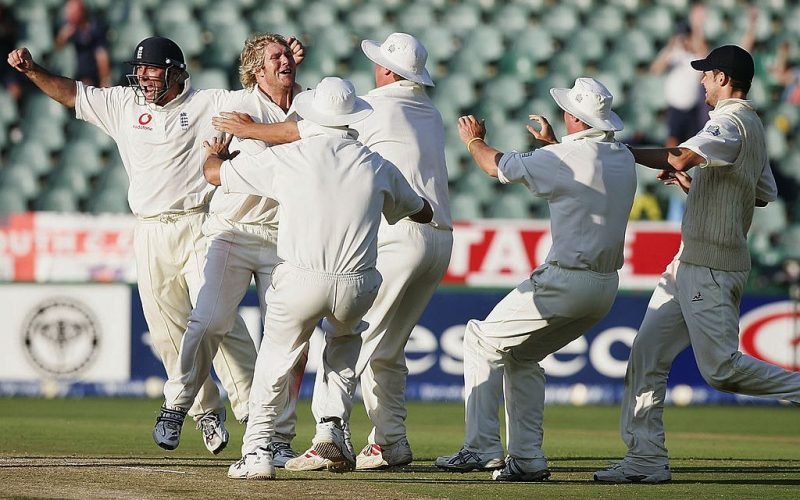
Hoggard leads England’s celebrations after taking the final wicket
South Africa were set 325 in 68 overs; with bad light likely, realistically it would be closer to 60. England’s depleted attack meant a win looked way beyond them, but South Africa were without their leader and chief England-walloper: Smith had been ordered not to bat after he’d suffered concussion in fielding practice.
A hastily changed top order couldn’t cope with Hoggard. He trapped right-handed de Villiers with a ball that nipped in, then castled left-handed Jacques Rudolph with one that arced back in. The very next ball was the biggy: Kallis edged a perfect, marginal away-swinger and Trescothick held on at first slip despite Jones diving across him. 18-3. Hoggard rampant.
With Hoggard finding the perfect line and length his crocked allies found inspiration. Flintoff became horrible to face and Harmison’s radar stuttered back to life (“the more sniff s we gave them, the more their injuries seemed to go away,” said Smith). There was one South African still going for the win, though: Gibbs took advantage of the attacking fields and flew to 98 before Giles finally removed him lbw, and from then it was all about survival.
The score read 163-7 in the 43rd over. Light fading. And out there, remarkably, was Smith; ignoring doctor’s orders at No.8. England sent out their non-playing men to act as ball boys in lieu of an almost deserted last-day stadium. It was an over from Flintoff that was decisive: roughing up Pollock with a furious bouncer that felled him and then dismissing him three balls later with one that bounced and moved away. With light draining away, Flintoff removed Ntini soon after and it was down to the last men standing: Smith and Steyn.
With Smith, who had passed 50, desperately trying to farm the strike, Vaughan cut off a potential single from the last ball of the 59th over, exposing Steyn to a full Hoggard over. He lasted two balls before the win was sealed with a kiss of the edge.
For South Africa it was a crushing defeat. Local journalists called it their most dispiriting loss since readmission. For England, it was more vindication of the Vaughan Principle. The fifth Test was drawn, giving England their first series win in South Africa for 40 years. Mission Ashes Regain was one giant step closer.
3. England’s new faces rumble the old guard
England v West Indies, First Test, Sabina Park, Jamaica
February 24 – March 1, 1990
Graham Gooch recalls the chaotic build-up and final glory of Kingston, 1990…
“I remember I was informed that Gower and Botham would not be on the trip. I didn’t really have a say on selection. It wasn’t so much a new era but there were new faces – Stewart, Hussain and we brought back Wayne Larkins.
“I remember speaking to Micky Stewart, we were scouring the country for an opener with experience and then it dawned on us – Ned. He was still playing well, he was a similar age to me. He came in for a year or so and did OK. He was a good influence on the team.
“We went there with everyone giving us no chance. We had a good team spirit and a reasonable bowling side. Gus Fraser was at his best then before he had his hip injury. We came up with a plan, we decided that against the West Indies we would try to make it difficult for them. We played four seamers, no spinner. We planned to bowl just a fraction outside off-stump ball after ball – relentlessly. We had two guys who could do that, Gladstone and Gus. Devon was a bit more of a wildcard. And the plan sort of worked. I remember Greenidge tried to take two to Devon, he was at fine leg in front of the pavilion, it’s not a very long boundary there. Devon went down to stop it, it hit him on the knee but he pinged it in and ran him out.
“We bowled them out for about 160 and Gus got five. That’s one of the first times I can remember, if not the first time, when the ball reverse swung. I wouldn’t say we knew exactly what reserve swing was then, but the ball was roughed up on that dry wicket. They were shining it but of course it was swinging the opposite way round. Gus swung the ball and that was not his style of bowling.
“Then we got 364 and bowled them out again. They had a good side. I remember Devon getting Viv Richards out and they collapsed. We won that game because we adopted a plan, we were disciplined and we were deserved winners.”
Lamb on the slaughter
The outstanding innings of the match came from the bat of Allan Lamb:
“We won our first Test match over West Indies after 30 attempts – it was 36 years since we had beaten them at Sabina Park – so that was real, great satisfaction. We had a lot of young players in that side, and as senior players Gooch and myself told the youngsters: ‘We can beat the West Indies. Go in with the self-belief that you can beat the West Indies.’ Years of defeats had been ingrained in players, but we got it in their heads that they could be beaten.”
The Moment
Dev Castles the King
“The crowd at Sabina Park were laying into me and I understood every word having grown up in Jamaica, so it really hurt. In response I trapped their hero Sir Viv Richards lbw and after that they were silent. Then in the second innings I got him again! This time clean bowled. From then on the press in the West Indies called me ‘The Chemist’ – I had the formula to get the Master Blaster out.”
“England’s victory unarguably qualified to be one of the most outlandish results in Test-cricket history”
– Wisden Almanack, 1990
2. Dancing in the dark
England v Pakistan, Third Test, National Stadium, Karachi
December 7-11, 2000
With the help of Alec Stewart, plus recollections from the autobiographies of Nasser Hussain and Michael Atherton, Ed Kemp relives England’s first win in Pakistan in 40 years.
England were a team in the early stages of rebuilding. Under Hussain as captain and Duncan Fletcher as coach, they were also at the start of a momentous new era: that of central contracts. Their first tour to Pakistan for 13 years was sure to be a rigorous examination.
England were intent on avoiding defeat first and playing for the win second. But two stodgy draws in the first two Tests of the three-match series had some of the touring journalists twitchy. The team’s slow progress in the first innings – in which they got up to 388 in reply to Pakistan’s 405 thanks to a 430-ball 125 from Michael Atherton – drew, Atherton later recalled, “howls of derision” from Michael Henderson in the Daily Telegraph.
Alec Stewart: The first two matches were dour and the third Test looked like it was going the same way. The pitches just didn’t lend themselves to attacking cricket.
Mike Atherton (from Opening Up): I knew the only way we could win the match batting second was to get up to their first-innings score, no matter how long it took.
Nasser Hussain (from Playing with Fire): Some people criticised the negative nature of the cricket but what were we supposed to do? Hand victory to them on a plate by playing as if we were in England? I’m not saying I would have been totally satisfied with three turgid draws but, hey, that’s not too bad in Pakistan…
In any case, the time difference found Hendo [Henderson] out. By the time his piece criticising us landed on the breakfast tables in London, we were well on the way to recording an extraordinary victory in Karachi.
Ashley Giles – who took 17 wickets on his first senior tour – bowled Inzamam on the fourth evening so that Pakistan ended on 71-3. As England chipped away on the final day, the hosts were six down at lunch, before finally being bundled out for 158 – Giles finishing with seven in the match. England needed 176 from a minimum of 44 overs. But Pakistan weren’t intending to bowl that many.
Hussain: The last day in Karachi was amazing. It had been nip and tuck, and now we had them exactly where we wanted them after 14-and-a-half days of cricket.
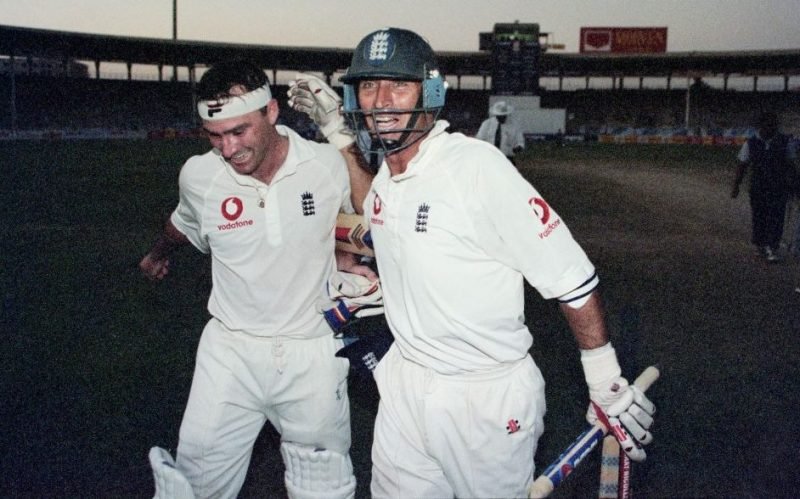
Hussain and Thorpe celebrate a series win in the twilight dark
Atherton: As I walked off for tea [Atherton made a brisk 26 in the chase], I turned to Inzamam and said, ‘We’re going to beat you, you know.’ He shook his head and said in his sonorous way, smiling, ‘No, no. We’ll never let you finish the match. It will get too dark.’ Inzi and his colleagues wandered off for their tea looking totally unconcerned.
After tea Pakistan captain Moin Khan set about slowing the over-rate; consulting bowlers after every delivery, and changing the field after more or less every ball.
Stewart: Quite understandably Moin Khan slowed the over-rate down, as we’d have done. If it had been today we’d have gone off but common sense and more prevailed. Steve Bucknor said to Moin that it was them who had slowed it down so he was not going to let them come off the field. Good strong umpiring in my book.
After Trescothick followed Atherton for 24 and Stewart departed cheaply, Graeme Hick (40) put on 91 alongside England’s standout player of spin, Graham Thorpe. At 5.30pm, with the light faded, the local mosque’s sirens sounded to indicate that the sun had gone down, signalling the end of Ramadan’s fasting hours. England still needed 12, with Thorpe and Hussain at the crease.
Stewart: Watching it from the changing rooms, we could barely pick the ball up. Facing it from 22 yards it’s different, you can get used to it, but in the field it looked almost impossible to see.
Atherton: I could see only shapes and shadows. I certainly couldn’t see the ball, and so it looked as if Graham Thorpe was playing shadow shots for a while. I’m certain he couldn’t see the ball. With six needed, Thorpe hit one out to cover, but Inzamam, fielding in the deep, saw nothing and remained unmoved as the ball passed just yards from him and went for four. When Thorpe inside-edged Saqlain Mushtaq for two – Hussain completing the second run back towards the pavilion with arms aloft and fists pumping – England had pulled off a remarkable series victory. It was their first Test win in Pakistan since their first full tour back in 1961/62. Just a few minutes later, the presentations took place in the pitch dark, as Atherton recalled, “with the moon and the stars now shining brightly. Inzamam had tears in his eyes.”
Hussain: These are the moments I played the game for. Not the money. Not the quest for an average of 40 or a hundred caps. The scenes in the dressing room after that were priceless. Silly things that mean so much. Like, for some reason, the team song at that time was Who Let The Dogs Out? so there we were, all singing it with this serious, middle-aged man in Duncan Fletcher in the middle woofing like a dog.
Atherton: In the dressing room Craig White was brandishing his bat around like a madman, and belted me on the end of the nose.
Stewart: Winning in Pakistan and Sri Lanka is the best winter of cricket I’ve had. To win away for home in the subcontinent was pretty much unheard of, and it was Pakistan’s first ever loss in Karachi after 35 Tests. When you tour Pakistan you tend to have a close-knit squad, and that was as close a group as I have been involved with for England.
Hussain: The players I celebrated that victory with that night in Karachi, where Pakistan had never lost a Test, will always be special… After what I had been through during the previous few months [Hussain had suffered a torrid run with the bat throughout 2000, not passing 23 in any of his 17 innings prior to the 209-ball 51 at Karachi] it was one of the great moments. It was about now I started referring to this team as ‘my boys’ and they will always be that to me.
1. The Boxing Day bruising
England v Australia, Fourth Test, MCG, Melbourne,
December 26-29, 2010
Having left Brisbane with a draw that felt like a victory and romped to an innings win at Adelaide, the wheels came off for England at Perth as Australia’s quicks stirred them into life to level the series 1-1 with two to play. Andrew Strauss sprung a surprise by electing to field at Melbourne and Steven Finn, leading wicket-taker in the series up to that point, was left out for Tim Bresnan. Jonathan Trott, who would go on to be named Man of the Match, picks up the story…
I remember Andy [Flower] being disappointed that we’d played the way we had and let Australia back into the series but we also knew they always played well at the WACA. Everything went our way at Melbourne. We won the toss and decided to bowl, which was a brave decision but the right one. As a captain you’ve got to make bold decisions and Strauss did that. Nasser is remembered for putting Australia in at the Gabba [in 2002] but Strauss wasn’t worried about that at all, which is the type of captain he was.
Bressy was bowling well in the warm-up games and everyone knew that if he ever came in he’d do a good job. It was just unfortunate for Finny that he probably wasn’t in great rhythm, even though he was taking wickets.
England’s seamers were all over Australia, reducing the hosts to 58-4 when drizzle brought an early lunch before skittling them for 98 – their lowest ever total against England at the MCG – by the tea interval. At stumps, Strauss and Cook had seen the tourists to 157-0. Trott entered the fray early on day two.
Quite a few times in the series I came in and the two openers had set the game up nicely. You can’t underestimate the importance of that – it’s nice to come in when the ball’s 40 overs old. At the MCG you sit upstairs in the viewing area and as I came down the stairs some Aussie said to me, ‘See you in a minute’. I think I was out there for about 10 hours. He was horribly wrong. That innings was probably in my top three. I was pretty fortunate that I came in when we were already past them so there wasn’t that much pressure but it’s an occasion I’ll always cherish.
Trott ended unbeaten on 168 as England posted 513, his partnership of 173 with Matt Prior rubbing salt into Australian wounds.
The innings of Matt Prior was special, too. Leading into the game he’d said that he couldn’t get going, that he needed a score. I said to him that things would turn around and I remember him nicking one off Johnson which was a no ball and he went on to get 80-odd. That was another big turning point in the game. It was a good partnership with him.
Meanwhile Ricky Ponting – who it would turn out was captaining his last Test match – was fraying at the edges, berating umpire Aleem Dar after a caught-behind referral against Kevin Pietersen was turned down.
He sort of exploded and I got an insight into all the pressure he was under. Everyone has their moment, their boiling point, and that was probably his. He wasn’t getting many runs, his team weren’t playing very well and he was having a bit of a rough time of it. Everyone’s entitled to let off a bit of steam.
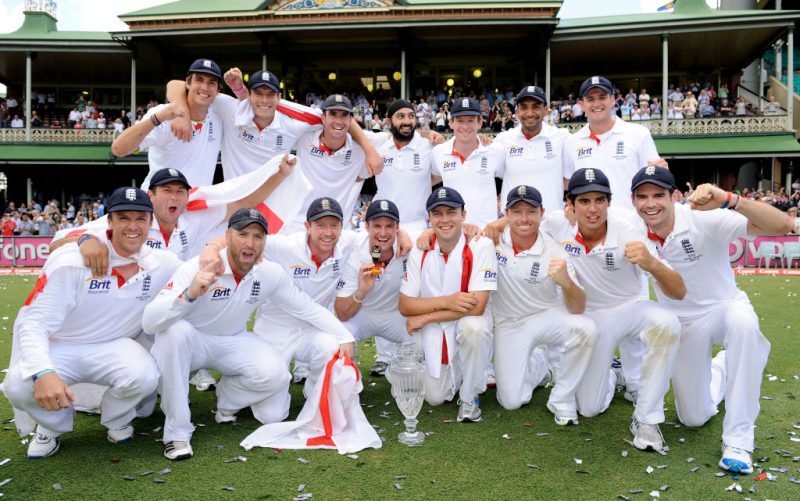
England took the fifth Test in Sydney to make it 3-1. It was their first series win in Australia since 1986/87
Ponting’s fate was sealed as England dismissed Australia for 258 early on day four to lose by an innings and 157 runs without an Aussie fan in sight at the 100,000-capacity stadium. England had retained the Ashes for the first time in 24 years on foreign soil in the most comprehensive manner imaginable, while Australia had lost two Tests in a home series by an innings for the first time in their history. Nine days later they would suffer another innings defeat at Sydney. England were in dreamland.
The Moment
Strauss’ big call
When Andrew Strauss opted to field after winning the toss several pundits suggested England had bottled it after being dismantled by Johnson and Harris at Perth. It would prove to be a masterstroke, as Australia fell to 58-4 at lunch and were finished off for 98 by tea.
“Bowling first was a huge call,” recalls James Anderson, who took 4-44 in the first innings. “A few guys had got involved in discussions that morning, looked at the pitch and thought there was a bit of green there. We thought that if we were wrong about the pitch, batted first and then it seamed we could be four wickets down after an hour and it’s so hard to win from there. But if we bowled first and we were wrong, we were confident in our bowling that we could keep it tight, not go at more than three an over and nag away. Even if they were 300-6 at the end of the day then we’d still be in the game. I thought that was a great call from Straussy to bowl first. We were quite confident about it.”
Going Barmy
Barmy Army talisman Billy ‘The Trumpet’ Cooper remembers the greatest night of them all.
A supposed Aussie Rules Football legend, not that I know anything about it, said, “Lads, why don’t you come up to my pub, I’ll let the Barmy Army take over.” So we did. We invited the England boys over thinking they wouldn’t turn up and about 11pm two minibuses rocked up with pretty much the whole English team piling out, they’d all had a few and that party went on all hours! The English lads were all behind the bar, pulling themselves pints and we were all up having a singsong. It’s the sort of thing as fans you dream of, meeting the players and having that two-way affection.
First published in 2016

